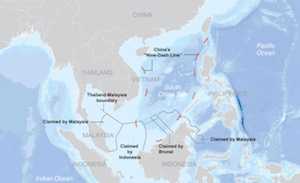BEIJING -- China's foreign minister took a hard line Tuesday on the country's claims to virtually all the South China Sea, saying it won't permit other nations to infringe on what it considers its sovereign rights in the strategically vital area.
Wang Yi, speaking to reporters at an annual news conference in Beijing, said another nation's claim to freedom of navigation in the region doesn't give it the right to do whatever it wants -- an apparent reference to the U.S., which has sent naval ships past reefs where China has engaged in island-building.
Wang sought to deflect allegations that China is militarizing the region by building military facilities on the artificial islands. He said China's development there was defensive and that other nations were being militaristic, not China.
"China cannot be labeled as the most militaristic. This label is more suited to other countries," Wang said.
In addition to reaffirming that South China Sea islands are an "integral" part of China's territory that "every Chinese is obligated to defend," he reiterated Beijing's refusal to cooperate with an International Court of Arbitration case filed by the Philippines over disputed claims in the area.
China says it is not bound by the arbitration because it filed a statement in 2006 that it would not accept "compulsory procedures entailing binding decisions" in regard to the U.N. Convention on the Law of the Sea.
Tensions have risen in recent months over China's ongoing project of building islands in the disputed Spratly archipelago by piling sand atop reefs and then adding airstrips, ports, radar stations and other military infrastructure. China also has deployed surface-to-air missiles on at least one of its holdings in another island group to the west and is expected to station warplanes on its new islands in the Spratlys, at least on a temporary basis.
Neighbors have complained that the work has raised tensions by changing the status quo in the area, where six Asian governments have overlapping claims and which include some of the world's busiest sea lanes.
Asked whether China would allow foreign journalists to visit those islands, Wang stressed that they also were intended for civilian uses and that once they are completed, foreign journalists would be invited.
China regards the U.S. and its allies as unwanted interlopers in the South China Sea and regards all actions by the U.S. Navy in the area as provocative despite the force's presence in the region dating from well before the founding of the People's Republic of China in 1949.
A top U.S. general said Tuesday that the Air Force will continue to fly daily missions over the area, with both nations' militaries in discussions to avoid any "miscalculation."
Gen. Lori Robinson, the commander of the Pacific Air Forces, also urged other nations to exercise their freedom to fly and sail in international airspace and waters "or risk losing it throughout the region."
"We've watched the increased military capability on those islands, whether it's the fighters, whether it's the missiles or the 10,000-foot runways. We will continue to do as we've always done, and that is fly and sail in international airspace in accordance to international rules and norms," Robinson told reporters in Australia's capital, Canberra, where she will address the Australian air force's biennial Air Power Conference next week.
Robinson conceded there was "a possibility of a miscalculation" leading to conflict in the increasingly militarized region.
But she said the United States and China had signed an agreement on air-to-air rules of behavior in international airspace in September and would continue discussions on the subject this year.
"That has allowed us to have continuous dialogue with the Chinese about how to conduct safe intercepts and intercepts in accordance with international rules and norms," Robinson said.
The South China Sea includes sea lanes through which more than $5 trillion in global trade passes each year, along with rich fishing grounds and potential oil and gas deposits.
Wang's tone changed considerably when questioned on the South China Sea by a reporter from Cambodia, China's strongest ally within the 10-member Association of Southeast Asian Nations, which also includes disputants Vietnam, Malaysia, Brunei and the Philippines.
China, Wang said, wants to boost cooperation with countries in Southeast Asia on matters such as the ocean economy, marine wildlife protection and maritime security.
To that end, Beijing is exploring the possibility of establishing a "South China Sea littoral states cooperation mechanism" under which the countries involved would "work together to maintain and build our common home, the South China Sea," he said.
Information for this article was contributed by Rod McGuirk of The Associated Press.
A Section on 03/09/2016


